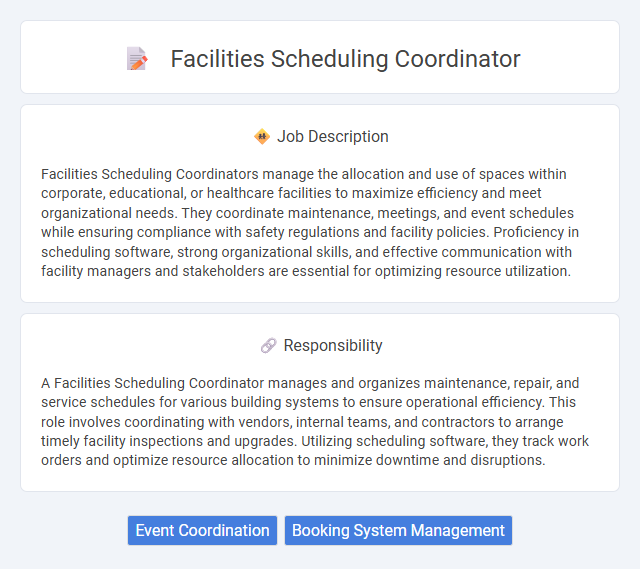
Facilities Scheduling Coordinators manage the allocation and use of spaces within corporate, educational, or healthcare facilities to maximize efficiency and meet organizational needs. They coordinate maintenance, meetings, and event schedules while ensuring compliance with safety regulations and facility policies. Proficiency in scheduling software, strong organizational skills, and effective communication with facility managers and stakeholders are essential for optimizing resource utilization.
Individuals who are highly organized, detail-oriented, and capable of multitasking may find a Facilities Scheduling Coordinator position suitable for their skills and temperament. Those who thrive in environments requiring clear communication and efficient time management might be well-matched to the demands of coordinating schedules and resources. Conversely, people who struggle with handling multiple priorities or adapting to changing schedules could potentially face challenges in this role.
Qualification
Facilities Scheduling Coordinators typically require strong organizational skills and proficiency in scheduling software such as Microsoft Outlook or Google Calendar. Candidates often hold a degree in business administration, facilities management, or a related field, complemented by experience in coordinating facility usage and maintenance schedules. Effective communication, attention to detail, and the ability to manage multiple priorities are essential qualifications for success in this role.
Responsibility
A Facilities Scheduling Coordinator manages and organizes maintenance, repair, and service schedules for various building systems to ensure operational efficiency. This role involves coordinating with vendors, internal teams, and contractors to arrange timely facility inspections and upgrades. Utilizing scheduling software, they track work orders and optimize resource allocation to minimize downtime and disruptions.
Benefit
Facilities Scheduling Coordinators likely benefit from enhanced organizational skills through managing complex calendars and resources. The role probably offers opportunities to improve communication abilities by coordinating between multiple departments and vendors. There is a good chance the position provides a dynamic work environment that fosters problem-solving and efficient time management.
Challenge
A Facilities Scheduling Coordinator likely faces challenges in balancing multiple complex schedules while ensuring minimal conflicts among maintenance, meetings, and event setups. The role probably requires strong organizational skills to adapt quickly to last-minute changes and resource availability. Effective communication with diverse teams is essential to anticipate potential scheduling conflicts and implement timely solutions.
Career Advancement
Facilities Scheduling Coordinators play a vital role in optimizing resource allocation and ensuring efficient use of space, which sharpens project management and organizational skills crucial for career growth. Mastery of advanced scheduling software and cross-departmental collaboration often leads to opportunities in facilities management or operations leadership roles. Gaining expertise in compliance standards and strategic planning significantly enhances prospects for promotion to senior coordinator or facilities director positions.
Key Terms
Event Coordination
Facilities Scheduling Coordinators oversee the planning and allocation of spaces to ensure efficient event execution across multiple venues. They collaborate with event organizers to manage timelines, resource availability, and logistical requirements, optimizing room usage and minimizing scheduling conflicts. Mastery of calendar management software and strong communication skills are essential for coordinating complex event setups and delivering seamless experiences.
Booking System Management
Facilities Scheduling Coordinators expertly manage booking system platforms to streamline room and resource reservations, ensuring optimal utilization of spaces. They maintain real-time updates in scheduling software like EMS or Skedda, minimizing conflicts and maximizing operational efficiency. Their role encompasses coordinating with various departments to align facility availability with organizational needs, enhancing overall scheduling accuracy.
 kuljobs.com
kuljobs.com